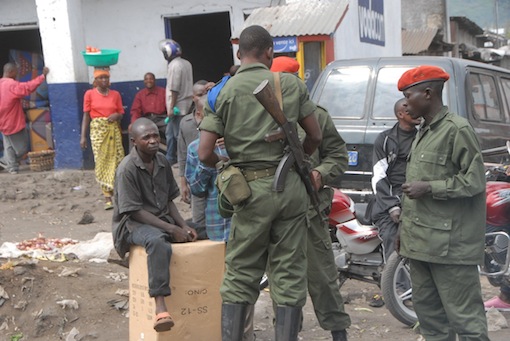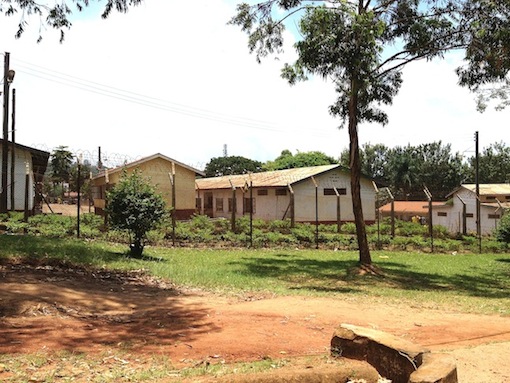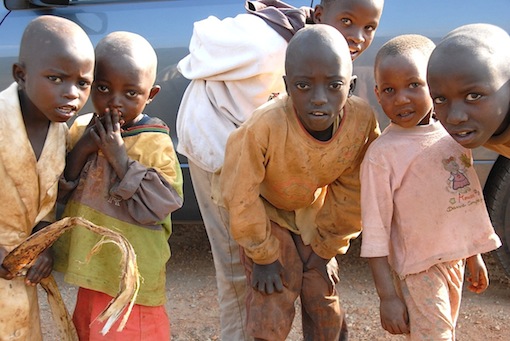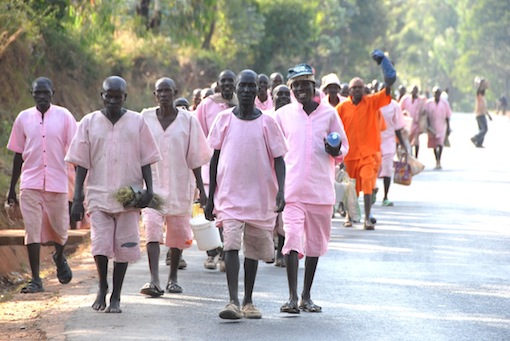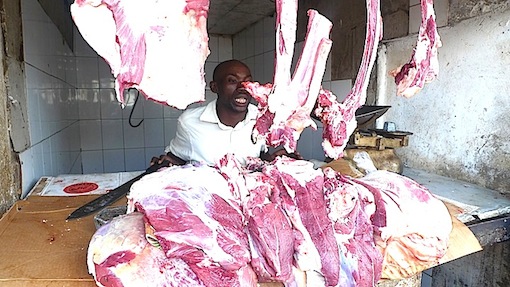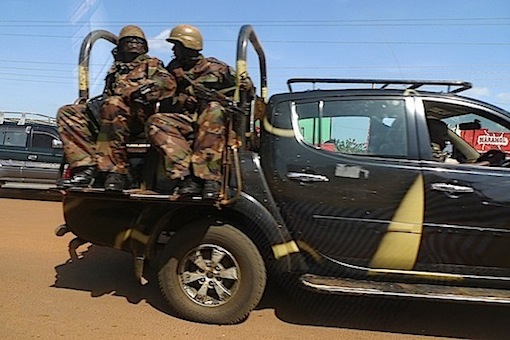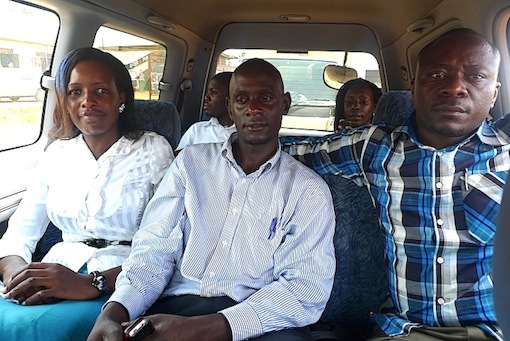In the three Western outposts of the eastern part of Africa – Uganda, Rwanda and Kenya – the opposition had either been totally smashed or is rotting in jail. Alternatively, it has ‘ceased to exist’.
In East Africa, those who are in power and those who want to be never challenge the supreme wisdom of market-fundamentalism.
There is no ideology here. Elections are fights between gladiators (Kenya) or of one gladiator against unarmed infants (Rwanda).
Corrupt politician A or corrupt politician B (both campaigning along ethnic lines and on behalf of their mercantile interests) ‘compete’ over who will be the one to dip his snout into a generous portion of caviar-seasoned feed at the end of the ‘democratic electoral process’.
It is a well known fact that in Kenya, for instance, victorious politicians do not scream: ‘Socialism or death!’ or ‘Let’s liberate our people from misery!’ They would not even dream of shouting something like ‘Down with neo-colonialism; and down with the foreign bases that are scarring our soil!’ The accepted phrase here is poignantly modest: ‘It’s our time to eat!’
In the recent Kenyan elections, not one single Presidential candidate dared to raise the essential issues that would most certainly cause the wrath of Western powers: comparing the virtues of capitalism versus the virtues of socialism in a poor country like Kenya, or unveiling the work of neo-colonialism on African soil; or, more concretely, opposing the RAF base in Kenya and the introduction of drones. Nor did they, candidates, protest against the US, British and Israeli intelligence agencies that are allegedly kidnapping, even disappearing, Muslim people – mainly fishermen – off the Swahili coast; nor did they promise to stop the senseless invasion of Kenyan troops to Somalia, something that had been fully orchestrated in Washington and London and dutifully implemented by Nairobi political and military lackeys.
“Kenya is a hostage to foreign interests”, I was told, in Kisumu, by one of the MP candidates, Edris Omondi, just a few days before the elections in March 2013. “We are suffering from a full-blown case of neo-colonialism here, in Kenya. If you want to know what Kenya is doing in Somalia, you have to first ask: ‘what are the interest of the West in this part of the world?’”
Such ‘revolutionary talk’, however, would never reach the Kenyan electorate through their television sets and mass-circulated periodicals.
In Rwanda, where the fascist regime is co-responsible for the loss of 6 to 10 million human lives in DR Congo, there is, at least, no charade about democracy. Sugary and sentimental serenades sung to Rwanda, to RPF and to President Kagame by ‘world leaders’ like Tony Blair, Bill Clinton, Bill Gates as well as by various high-ranking officials at the World Bank, are perfectly composed and orchestrated by leading apparatchiks and chief ideologists of the Western Regime. Everyone is so dreadfully sorry for ‘doing nothing to stop 1994 genocide’, but the incomparably worse and still ongoing genocide performed by Kagame, RPF and his militias in neighboring DR Congo is hardly ever mentioned by the establishment media.
The most prominent opposition leader in Rwanda, Ms. Victoire Ingabire Umuhoza, is in prison, locked away for 8 years after being accused of ‘terrorism ’. Her head is shaved and she wears the pink uniform of political prisoners; her main sin her wondering aloud: ‘why are there only Tutsis who are commemorated at Kigali Genocide Memorial, if even Paul Kagame admits that both Tutsis and Hutu were killed in those infamous 100 days, in 1994?’ But her arch sin is that she dared to return to her country after 16 years in exile to compete against one of the most notorious mass murderers ever born on the African continent.
Ms. Victoire Ingabire could still be, in relative terms at least, considered ‘lucky’. Lucky because many other Rwandan opposition leaders and figures have already been murdered in cold blood, or at least forced into exile. The list includes several elite members of Kagame’s RPF, those who dared to cross their supreme leader. It also contains the names of numerous journalists, and even one famous hotelier – Paul Rusesabagina – who was credited with saving hundreds of Tutsi lives during the 1994 massacres. His actions depicted in the movie “Hotel Rwanda”, became part of the unchallengeable Western interpretation of historic events. But now Mr. Rusesabagina, like so many others, lives in exile in South Africa.
Political prisoner Victoire Ingabire never became a sweetheart of the West, like, for instance, the Burmese opposition leader, Aung San Suu Kyi. It is maybe because Burma is not plundering an enormous country rich with natural resources, like Rwanda is plundering DR Congo on behalf of Western companies and governments.
Rwandese opposition is expected to shut up and wait for a few more years at least. The bootie is obviously not yet satisfactory, and the 6-10 million human lives lost in the Congo is still somehow tolerable for the politicians and the captains of economy in Washington, London, Brussels and elsewhere.
Brutal reality is that most African countries are not in a position to decide anything. Their opposition leaders win when they are told to take power, when they are allowed to win by their foreign handlers. It is back to colonialism, minus those great African heroes of the past like Patrice Lumumba and Julius Nyerere.
When the West gets tired of Kagame it will simply depose him, or let him fall. And a new crony, some new gangster ready to serve the West, will get ‘elected’ through the ‘democratic process’, to a background of loud fanfare celebrating ‘multi-party’ democracy and the ‘African renaissance’.
Heat wave or drizzle, almost every day – twice a day – on the road connecting Entebbe and Kampala, the sirens begin squeaking loudly and the convoy of armored and armed vehicles moves at neck-breaking speed, pushing all civilian traffic to the shoulder, even if ‘needed’, to the ditch.
There goes the flamboyant Mr. Yoweri Museveni, the President of Uganda, and a strongman who has held the reigns of power since 1986. He wears a cowboy hat, even though he rides inside a cool vehicle – to his office in the capital city or when returning home in the evenings.
It is quite an impressive sight to see that luxury, bulletproof Mercedes and the SUVs of Museveni’s heavily fortified guards all flying past the decrepit and miserable huts and the destitute individuals who live in them along the main road of this conflict-torn nation, one of the poorest on earth.
Uganda is a mess. Brutal civil war is raging in the north of the country. There, according to countless reports, HIV-positive military men are ordered, periodically, to rape rebellious soldiers and insurgents. Mr. Museveni hates gays, and he occasionally threatens them with capital punishment just for being what they are. But homosexual rape is clearly something he approves of, something he even commands.
He can get away with virtually anything. A loyal mercenary of the West in the region, Uganda is deeply involved in Somalia, Sudan and above all, in DR Congo.
The ‘involvement’ of Rwanda and Uganda in DR Congo is, of course, well documented, in the 2010 ‘UN Mapping Report” and in the conclusions of other investigations. But that is not preventing the West using Ugandan troops as ‘peacekeepers’ all over Africa, particularly where their interests lie.
After the UN “Mapping Report” went to print, Mr. Museveni allegedly got very angry, which was enough to force the UN Secretary General Ban Ki-moon to fly to Kampala to shamefully beg the dictator not to abandon UN peacekeeping missions!
“Both Rwanda and Uganda are plundering DR Congo, killing millions. Museveni admitted it, Kagame never did. But both regimes are dictatorial, with close links to the West. And the Western public is unaware of what is happening,” explained Nii Akuetteh, Ghanaian political analyst during our meeting in Washington.
Paul Kagame was educated and groomed in Kampala and, according to former US Ambassador to Rwanda, Robert Flatten, he was even armed by the West in this city. Before the 1994 shooting down of the Falcon jet that had the Rwandan and Burundian Presidents on board, and the consequent genocide, Kagame was allowed and encouraged to train his brutal RPF forces on the territory of Uganda. For a long time he functioned as the head of Ugandan military intelligence, overseeing interrogations, cruel torture and even the murder of countless Ugandan political prisoners. I personally interviewed one victim in Kampala who testified about how he was tortured on Paul Kagame’s orders.
Knowing the facts, it does not come as a surprise that the plundering and ravishing of DR Congo is not openly on the agenda of the Ugandan opposition. Demanding that the pillage stops could easily lead to straining ties with North America and Europe.
Of course, there are other, ‘domestic’ calamities. There are child beggars at almost every corner in the center of Kampala, some as young as 3 years old. There are adult homeless people, even women, living on the pavement, with empty, resigned looks in their eyes.
As I drive through the capital, there are signs of discontent everywhere.
“The social situation in Uganda is terrible and continuously deteriorating”, explains Mr. Kaliija James Kats, Program Manager of YLF Uganda. “People are at the edge.”
It is true. And the leaders of the Ugandan regime are brutes, incomparably worse than those who governed the country during the infamous reign of Idi Amin Dada.
With cruel inter-tribal onslaughts, the old historic buildings of Buganda Kingdom going up in flames in 2010, political violence, aggressive foreign policy and appalling misery in both urban and rural areas, Uganda is hardly a place that one imagines would be supported by any sane government or influential individual abroad.
But it is supported whole-heartedly and has been for many years and decades, by several Western powers that use it as a trusted ally in their deadly geo-political games.
On top of that, this ally, occupying in such an important position in such a mineral-rich part of the world, has to be well ‘secured.’
“The opposition, the civil society, the government – everybody is getting money from the West”, Doreen Nyanjura, a young Ugandan writer and activist and member of the opposition, tells me.
“Does it mean that whoever wins will be obliged to go to Washington and London for guidance?” I ask.
“This is a very poor country…” she replies.
To give the credit where it is due, unlike in Rwanda, there actually is, at least, some opposition in Uganda.
Its members periodically protest; they write books and articles, arrange demonstrations, and even end up in prisons.
But they are also very careful not to alienate the West. There is very little talk about alternative political and economic systems. There is no naming names and, like in Kenya, no public exposure of neo-colonialist and imperialist designs of foreign rulers.
“You write so often against the West; against imperialism”, my Kenyan friends from the Left periodically tell me. “You stand by Venezuela, Cuba, China and Vietnam against Western ideological and real attacks. What kind of funding do you get from them”?
I say I get nothing. They don’t believe me. They insist. Why would I work, why would I choose to stand in opposition to the Western regime, if the people I defended did not pay me a regular salary, or at least some substantial ‘bob’.
In East Africa, being in opposition is often a job; sometimes lucrative, sometimes not too profitable, but always a job.
I mumble something about internationalism, about humanism, about duty. My friends listen, politely. After some time, they lose patience with me: “But who pays for your work?”
I tell them that I keep recycling almost everything that I earn from my films, books, articles, talks and my other work… I recycle it into more work. I don’t save; I don’t invest… I tell them that I almost never ask for funding; that I am scared of funding. They lose interest almost instantaneously. From there, our discussion often moves from revolution to the weather.
“We have to convince Venezuela and China to pay; to support us”, I recently heard in Kenya from another candidate who aspired to a Parliamentary post. “They don’t pay you anything?”
“Well, when they print my articles or show my films… or when I speak at their universities…”
He hit the table with his fist, outraged: “They have to pay. If they don’t, nothing would change here!”
Before we parted, Doreen suggested: “Come to the high security prison with us, tomorrow. The leader of the opposition is there, his personal secretary is there, even the driver who was at the scene, during the arrest.”
I agreed. We set up the time for the next day.
The night before our visit to prison, I met one of the ideologues of the opposition party, a bitter, aging man who did not consider China or Vietnam to be true ‘socialist countries’, who did not considered Latin American revolutions to be ‘revolutionary enough’.
“I will tell you something”, he insisted, although I was trying to get away from him. “I don’t think that Bolivia or Venezuela are socialist countries. Actually, I don’t think that even Cuba is socialist.”
“You are pissed off about the Mao pants?” I suggested.
“What?” He did not understand.
“They don’t wear blue Mao pants in China or in Latin America”, I suggested. “And they travel freely all over the world if they can afford it. And, in most of these countries people want to be equally rich, not equally poor… And…”
The evening did not end well. I told him that not all socialist movements have to resemble the Western conception, that there are variations, like the Latin American interpretation of socialism, like the Chinese interpretation, like my own interpretation, like millions of other interpretations. And I suggested that he and Uganda start thinking about their own socialist concept, instead of digging into some fundamentalist, dusty, Western version from centuries ago.
The morning did not begin well either. Doreen could not get the car. My car was in Kenya. I offered my hired taxi.
She came with two young leaders of the opposition. We stopped at the market, to buy vegetables and meat for the prisoners, and then we drove towards the Luzira jail.
In case my readers have never visited any of the high-security prisons in Africa, here is a valuable piece of information about how to enter: ‘Drive to the gate, get checked, get searched, get your car turned up-side-down, then leave your cameras and mobile phones at the guard’s room. Leave all your money behind, even coins, and of course all sharp objects. Fill in some blanks, questionnaires. Present the ID, explain who you are, whom are you visiting, why are you here. Get checked again – metal detector, patting. It is a bit like take domestic flight in India, but even worse.
There is a short interview… And then your request gets rejected at the end…
I had one official East African ID on me, and in the end they let us all in, together with the defense lawyers.
* * *
The leader of Ugandan opposition – Dr. Besigye Kizza – was released one day earlier.
“He wanted to stay, with the others, but they literally pushed him out, made him leave the jail,” explains Doreen. “If he would stay here, there would be a riot.”
We go through several more layers of security and end up in a small room staffed with high-ranking jailers – ‘officers’ – watching our every move. There is also some European official there, almost licking the boots of the prison guards, smiling at them, cracking primitive jokes, flattering everybody around. He is an appalling type, a typical Euro bureaucrat; a collaborator, an individual one sees in all Western colonies like Cambodia, Indonesia, Thailand, Rwanda, or Djibouti. I always wonder where do they manufacture them?
They bring the prisoners: Sam Mugumya, Political assistant to Dr. Besigye Kizzi, and the driver who was transporting opposition during the arrest.
Sam is a socialist; that much I know. He is also a writer; he wrote a passionate book called “Road to The Revolution”.
The driver is crying. He has obviously nothing to do with all this; he is just a minivan chauffeur, but the police grabbed him, brought him to the station, beat him up, took two of his mobile phones and all the money he collected from fares for entire day – over US$100.
“They are beating me up all the time!” he keeps sobbing. “During the police raid against the opposition, a police SUV smashed into the back of my van. And now they want me to compensate for the loss. I have nothing. They ruined my life…”
Sam is clearly one of the highest leaders of the opposition. He knows about me, and about me coming to see him.
The next day I am leaving Uganda and in one week I will travel back to Asia. There is no time to lose. We have plenty to say to each other.
Sam goes through the necessary routine, the testimony he is obviously not enjoying: “Prison is crowded, overcrowded. They treat us terribly. The driver is beaten every day. Those who are leading the investigations are actually criminals…”
At some point he stops. He suddenly grabs my hand.
“Chavez”, he sighs. “How is Venezuela?”
“Coping”, I reply. “It is not easy, but coping… There is an investigation…”
“I know,” he says.
“I will go there soon.”
“We will talk before you go…” Then he looks straight at me: “Before I die, I want to go to South America.”
I nod. I don’t want to tell him “You will not die anytime soon.” This is Uganda. He fights. He is one of those very few people in eastern Africa who is fighting. I say nothing. I squeeze his hand briefly, and let go.
“Sam”, I say. “Those millions in Congo… Is that on the agenda? On your agenda…”
“Of course we are aware that Museveni is playing a subservient role to the West”, Sam speaks very fast, afraid to be interrupted by the guards. I take notes. He stops once in a while, to catch breath.
“Talk”, I tell him. “Please”.
“For the West, Museveni has been a very effective ‘buffer’ against Sudan. He was, of course, very useful for US interests in DR Congo. US give us – to Uganda – money and we give them bodies that they want us to shoot. We are like a mercenary force – the whole country. The West talks human rights, and then it throws money at us. We take money and we kill. The West is two-faced; it cares absolutely nothing about human rights. It only cares about its own interests.”
“Are you going to change things?” I ask. “If your party comes to power… If Kizza wins, somehow… if they let him win… You know what I am saying, right?”
“Sure. I know perfectly what you mean… We have to be… we also have to be tactical. We just cannot directly confront the West… You see, Venezuela… There are different dynamics. In South America, there is great unity now, and people understand… they want independence. This is what is lacking here. And our social organizations – they are not where we want them to be, yet. Like this, we are not yet ready to go to the direct opposition.”
I realize he is not talking about his party here in Uganda, now; he is talking about the opposition that could be finally real, similar to which took power all over South America.
“We have to raise consciousness about the revolution”, he whispers. “Revolution is inevitable, desirable… We are studying how to make it happen.”
Soon we have to part. We embrace. They lead Sam away and I have to present my notes to the censor.
The censor is looking at the pages of my notebook. It is clear he understands nothing. There are no names and no numbers. There is only some theory, absolute worthless shit as far as he is concerned.
“All clear”, he gives me my notebook back. “You can go now.”
After leaving prison we witness a small riot at a fuel stop. One more riot, in a single day.
Some people joined us. Now I have half of the Ugandan opposition leaders sitting in my car, or at least that’s how it appears. All of them are squeezed; all cursing Museveni.
I think about Egypt and about Indonesia; countries that each succeeded in forcing one man to step down, but where the regimes survived, regrouped, and became even more resistant to real change, to the revolution. Like roaches and rats, they have been digging holes and trenches, preparing to survive anything, even nuclear holocaust.
“Do you get some support from the West?” I ask one of MP candidates.
“Not necessarily support”, he replies. “But we are given some money.”
The road is blocked by several SUV’s decorated by colorful flowers and paper lace. There is some loud music and the traffic is moving at a snail’s pace.
“Is it a wedding?”
“Oh no”, smiles Doreen. “This is a celebration for the former Minister of Health, who is being released from prison.”
“Is he also from the opposition?” I ask.
“No. He is corrupt bastard. And it was correct to put him to prison… But people are so fed-up with Museveni that anybody who ends up in prison in Uganda is seen as a hero.”
“But the man is a thief, right?” I wonder.
“A thief”, yes, everybody in the car confirms.
“And the country is celebrating his release…” I say.
They all nod.
When everybody disembarks in front of Parliament, my driver takes me to the hotel.
We have a long history together. He drove me to several border regions with DR Congo, to dreadful refugee camps, to war zones. He helped me a lot when I was filming for my major documentary “Rwanda Gambit”.
He does not speak much, he never does. But he is my friend; an old man who saw, it appears, all there is really to see.
“You have just listened to several opposition leaders.” I smile. “Do you feel better about the future of Uganda?”
I know he hates the President. And I am surprised when he slows down and says, calmly:
“I heard all those things they were saying, before. But I did not hear what will really happen to my country when the old bastard steps down!”
Andre Vltchek is a novelist, filmmaker and investigative journalist. He covered wars and conflicts in dozens of countries. His book on Western imperialism in the South Pacific – Oceania – is published by Expathos. His provocative book about post-Suharto Indonesia and market-fundamentalist model is called “Indonesia – The Archipelago of Fear” (Pluto). He just completed 130 minutes documentary film “Rwanda Gambit” about Rwandan history and the plunder of DR Congo. After living for many years in Latin America and Oceania, Vltchek presently resides and works in East Asia and Africa. He can be reached through his website.
